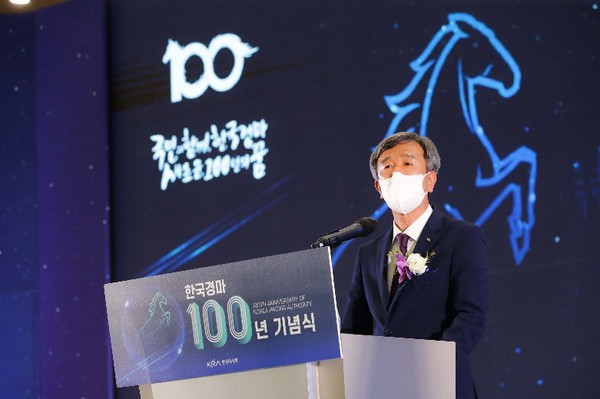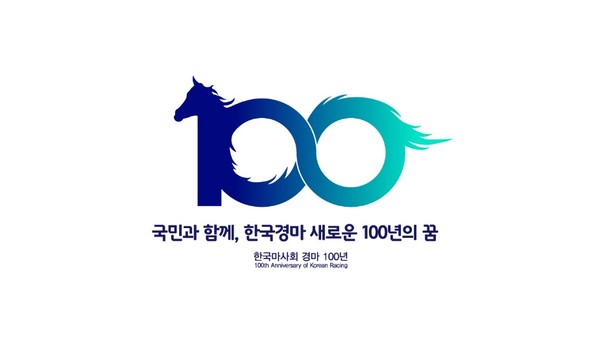KRA declares a new vision on the 100th anniversary of the implementation of Korea’s horse racing
The Korea Racing Authority(KRA), led by CEO Jung Ki-hwan, held a ceremony to commemorate the 100th anniversary of the KRA at Seoul Race Park on May 19 in the presence of many domestic and foreign guests.
After the establishment of the Joseon Horse Racing Club in 1922, Korean horse racing first began at Dongdaemun Training Center Plaza in Seoul on May 20, 1922 and this year marks the 100th anniversary of its implementation.

Korean horse racing, which started in a barren land, has achieved rapid development as a popular sport over the past 100 years, and Korea has risen to become the world's 7th largest horse racing country in terms of sales.
By creating horse racing facilities at the level of advanced countries, it provided leisure spaces to the people and laid the foundation for the success of the Asian Horse Racing Conference (ARC) and the Asian Games and Olympic equestrian events.
In addition, the establishment of a racehorse fostering ranch, scientific training facilities, and continuous promotion of preferential policies for domestic horses have provided a foothold for independent horse racing practices.
Through these efforts, we have sent live Korean horse racing to 16 overseas countries (in sales of 51.7 billion won in 2021), exported horse racing infrastructure to developing countries, held international competitions, promoted domestic horse overseas expeditions, and achieved the world domination of Knicks Go. The status of Korea’s horse racing is gradually rising..
Through this, it contributed to the national finance (about 1.5 trillion won per year) and created income from racehorse producers (about 10 billion won per year), and created resources for the growth of the horse industry by contributing to the Livestock Development Fund (about 100 billion won per year).
KRA has contributed to the national economy as a public institution by creating various jobs (direct and indirect employment of about 10,000 people) and supporting social contribution funds (about 14 billion won per year).

However, with the 100th anniversary of horse racing, the KRA faced the greatest crisis since its foundation, such as the suspension of horse racing and the collapse of the foundation for the existence of the horse industry due to COVID-19 pandemic.
Accordingly, the KRA has set the 100th year of horse racing as a turning point for the institution to take another leap forward to rebuild the domestic horse racing and horse industry and fulfill its social responsibility.
Through the new vision, the KRA has expressed its will to overcome the crisis and innovate for the future, both internally and externally.
The vision presented by the KRA is the 「VISION 2037, Global Top 5 Horse Industry Leading Company」.
It promises to the people to achieve the goal of developing the horse racing industry from the 7th to the 5th in the world within 15 years and becoming one of the top 5 developed countries in the horse industry (USA, France, UK, Germany, and Australia).
The declaration of the new vision was announced jointly by CEO Jung Ki-hwan of the KRA and co-Chair Lee Soo-ah of the Korean Horse Racing 100 Years Project Promotion Committee.
This is to give the meaning that the older generation and the MZ generation both pledge to practice the 100-year vision.
In addition, the slogan for realizing the vision was confirmed as “100 Years with Horses, the Korea Racing Authority Running Again” based on the opinions of external committees, horse racing-related organizations, and the executives and staff of the equestrian society.
This is to express the will of all horse racing members to establish a unique identity for the institution through sharing the achievements of 100 years of horse racing and to take this as a central point to take another leap forward.
Four strategies to achieve the vision are:
① Providing high-quality horse racing services with global competitiveness
② Promotion of KRA-type digital transformation
③ Opening of the era of companion horses with people’s lives
④ Promotion of ESG management that communicates with society
This will be embodied in 12 practical tasks with key keywords: ▲ win-win and communication, ▲ cooperation, ▲ organizational transparency, ▲ animal welfare and ▲ growth and sharing.
Chairman Kim Chun-soon of the National Gambling Control Commission, who read the congratulatory remarks on that day, said, “I would like to express my gratitude to all the people involved in horse racing for the dazzling achievements of Korean horse racing so far” he said.
CEO Jung Ki-hwan of the KRA said, “In the past 100 years, our status on the world stage has changed as we have challenged many limitations, but there were many things that were lacking in the expectations of the people.”
He added, “Through the implementation of the new 100-year vision promised to the people today, we will make K-Racing proud in the world by embodying values beyond horse racing as an industry that contributes to the nation and the public interest.”

